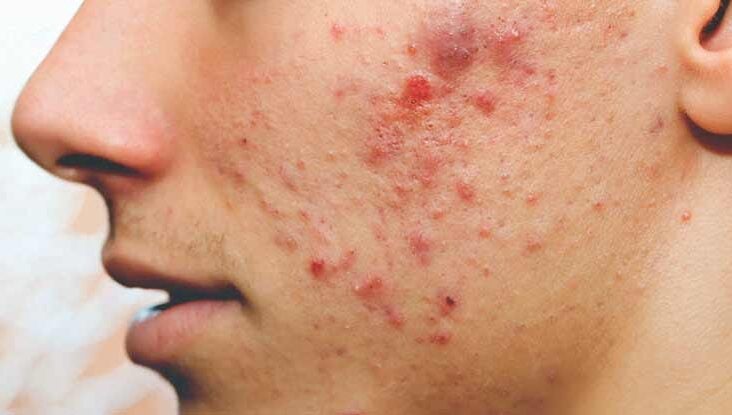10 acne facts
In this article we will describe 10 facts about acne. Here goes.
1. Acne is a very, very common skin condition
It that affects most people at some point. It causes spots, oily skin and sometimes skin that is hot or painful to touch. Acne most commonly develops on the:
- Face – this affects almost everyone with acne
- Back – this affects more than half of people with acne
- Chest – this affects about 15% of people with acne.
2. What causes acne?
Acne is caused by overactive oil glands in the skin and a buildup of oil, dead skin cells, and bacteria; which leads to inflammation (swelling and redness) in the pores.
Oil glands get stimulated when hormones become active during puberty. That is why people are likely to get acne in their teens.
Because the tendency to develop acne is partly genetic, if other people in your family had (or have) acne, you may be more likely to have it as well.
3. Do you have acne forever?
No. It usually goes away in adult life.
4. What are the symptoms of acne, i.e. what does it look like?
There are different types:
- Blackheads – small black or yellowish bumps that develop on the skin; they’re not filled with dirt, but are black because the inner lining of the hair follicle produces colour
- Whiteheads – have a similar appearance to blackheads, but may be firmer and will not empty when squeezed
- Papules – small red bumps that may feel tender or sore
- Pustules – similar to papules, but have a white tip in the centre, caused by a build-up of pus
- Nodules – large hard lumps that build up beneath the surface of the skin and can be painful
- Cysts – the most severe type of spot caused by acne; they are large pus-filled lumps that look similar to boils and carry the greatest risk of causing permanent scarring.
 Quite severe acne
Quite severe acne
5. How can I prevent acne?
There is no fool-proof way to prevent acne. But these tips might help reduce the number and severity of your breakouts:
- Washing your skin – is the most important thing you can do. It helps remove excess surface oils and dead skin cells that can clog your pores. But washing too much can cause damage by making your skin too dry or irritating acne that’s already there.
- Wash after exercising – because sweat can clog your pores and make your acne worse. If you work around greasy food or oil, if you’ve been sweating from heat or from working hard, wash your face and other acne-prone areas as soon as possible.
- Skin products (e.g. lotions or makeup) – look for ones that are non-comedogenic or non-acnegenic, which means that they don’t clog pores.
- Hair spray or gel – try to keep them away from your face as much as possible. Many hair products contain oils that can make acne worse. Try to use water-based products.
- Clothing – if you get acne on areas such as your chest or back, avoid wearing tight clothes, which can rub and cause irritation.
6. How is acne treated?
Over-the-counter (OTC) products work to help clear up acne for some teens. Go to your local pharmacy for advice.
It may take time to find one that works best for you – some may not help and others may irritate skin. OTC acne products come in different strengths. The most popular and effective OTC is benzoyl peroxide. Another ingredient, salicylic acid, can help dry up pimples.
7. When should I see my GP for acne?
See a GP if your acne is moderate or severe, or medicine from your pharmacy has not worked, as you probably need prescription medicine.
Prescription medicines that can be used to treat acne include:
- Topical retinoids
- Topical antibiotics
- Azelaic acid
- Antibiotic tablets
- In women, the combined oral contraceptive pill.
8. What about more severe acne?
If you have severe acne, or prescription medicines are not working, your GP can refer you to a hospital consultant who is expert in treating skin conditions (called a dermatologist).
If you are taking a prescription medicine for acne, finish your entire prescription even if your skin clears up, unless your doctor says it is OK to stop. If you stop too early, there is a chance your acne could break out all over again.
9. Should I squeeze a pimple?
It is tempting, but popping or squeezing a pimple usually will not get rid of the problem. Squeezing can actually push infected material and pus deeper into the skin, which can lead to more swelling and redness and even scarring, which can be permanent.
10. What about food?
Eating nutritious foods can help keep you healthy and your skin will benefit from getting enough vitamins and minerals. But you do not need obsess about what you eat or how often you wash your face to control acne. If no OTC product works for you, talk to your doctor (or dermatologist) about how to manage acne.
Summary
We have described 10 acne facts. We hope you understand it better now.
Last Reviewed on 9 May 2024
